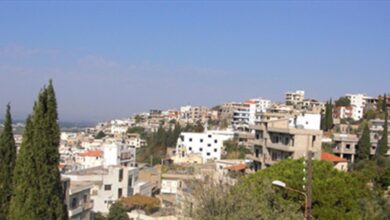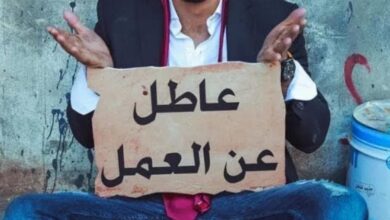New guests to grocery stores and buying by the kilo
New faces are welcomed by the “Bale” market during the holiday season. After it achieved wide spread recently in various Lebanese regions due to the difficult economic conditions that the country is going through, the market acquired a larger number of customers this year, including the rich who are looking for international “brands.” At prices less than a quarter of the value of their new counterparts, in addition to the poor, the old and regular customer, who is looking for cheap clothes for himself and his children in order to cheer up his family on Eid within his meager means.
Sahar (37 years old) wandered among the hanging used clothes, in one of the well-known stores in the southern suburb near St. Mikhael Church, accompanied by her daughter, carrying a small basket in her hand, after her family’s financial hardship became severe.
Sahar, a housewife from Baalbek, was visiting her relatives in the suburb, and she went to the Bala Market after she met him through social networking sites. She says: “We are no longer able to shop in regular stores and large “malls” during the holidays. I have three children and other priorities, such as… Paying household, medical, food, etc. bills, and here I can buy many items for 500 thousand liras.”
She added: “I chose a shirt for Eid and its price did not exceed 200 thousand liras, while in regular stores its price is no less than 15 dollars.”
Online shopping
Social networking sites are no longer just platforms for entertainment and display, but have become a means of earning money, establishing and establishing profitable trade with new business ideas created by young men and women of this age.
After technological development and the virtual world entered the commercial market, pages were opened to sell used clothes, and many people resorted to selling some of the clothes they were wearing that no longer suited them in order to make money.
Sally, a young woman who owns a platform for selling used clothes, says, “There are platforms similar to hers that sell “bare” to acquaintances and friends only, and others open their doors to everyone with delivery services.”
As for prices, she points out that “they are many times cheaper than buying clothes from malls.”
Stores that sell by “kilo”
The idea of selling clothes “by the kilo” began shortly after the economic crisis, and later became widely popular. The beginning was in one store, and today the stores are spread throughout various Lebanese regions. Pointing out that this type of store sells in Lebanese pounds and is not like regular stores that refuse to sell their products exclusively in dollars, and this is what made people flock to stores that sell clothes by the kilo.
There are two main reasons that led to the prosperity of this type of trade. The first: sales are in Lebanese pounds and according to the weight of the clothes, taking into account not to raise the price.
The second: Merchants buy large quantities of international brands that are unique in their quality and design, in addition to European microfibers at low prices, and this is what drives them to sell in ways that take into account and suit people’s living and economic conditions.
Which means that these clothes may be of excellent material and manufactured by their parent companies, and they have a well-known European and American quality, and are sold at low prices for normal reasons that always occur in clothing markets, such as the expiration of fashionable clothes or the accumulation of large quantities that are surplus to the market’s need. They will be sold as a whole to get rid of their burdens and avoid further losses.
Is “bale” safe?
Dr. Wafa Alam El-Din, a consultant dermatologist, points out that “wearing used clothes increases the risk of transmission of infection between people, and we do not know the condition of the person who was wearing these clothes, whether he has any skin diseases or not.”
Alam El-Din continued: “There are many bacteria and microbes that remain stuck on used clothes after washing them in the usual way, which increases the risk of developing tinea versicolor, causing itching in the body and a change in skin color.”
These clothes must be exposed to sunlight before wearing them, to eliminate the largest percentage of microbes. She advised cleaning them by boiling them and then ironing them with steam, because the high temperature eliminates bacteria and viruses that may infect the body.
Bale history
The phenomenon of the popularity of bale markets dates back to 1975 at the beginning of the war, when used clothing stores were spread exclusively in some of the poorer popular areas, but today their spread has become broader and more general.
Tripoli is considered one of the oldest Lebanese cities in this field, as its bales have been widespread since the 1950s.
Most of the bale shops today sell used clothes and shoes imported from outside Lebanon. As for the “outlet,” it contains new clothes of international brands, some of which have manufacturing defects, and some of which have been disposed of by international companies so that they do not remain a burden on them in their warehouses. This type is known as “international stockings.”
In the end, “bare” clothes became clothing for a large segment of the Lebanese who did not stand helpless in the face of poverty to accumulate and become destitution.
[previous_post_link]





